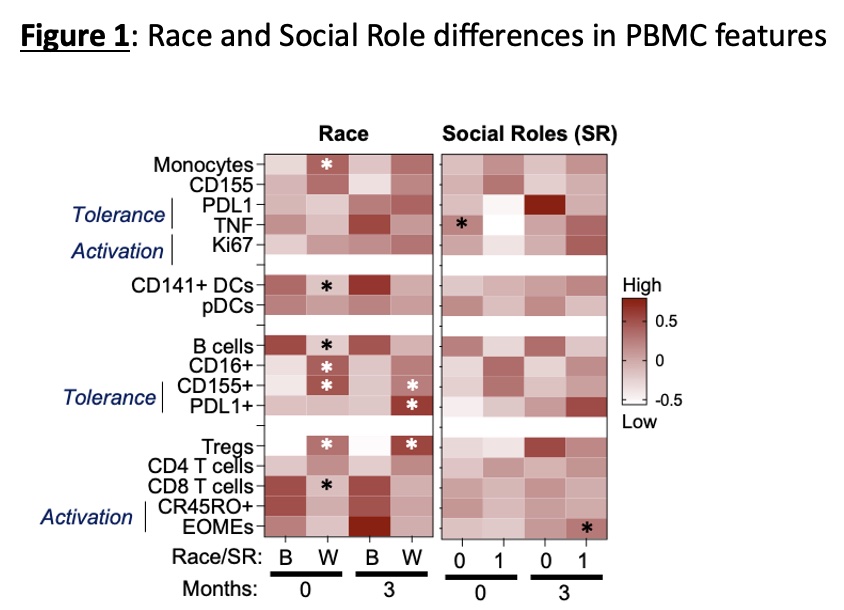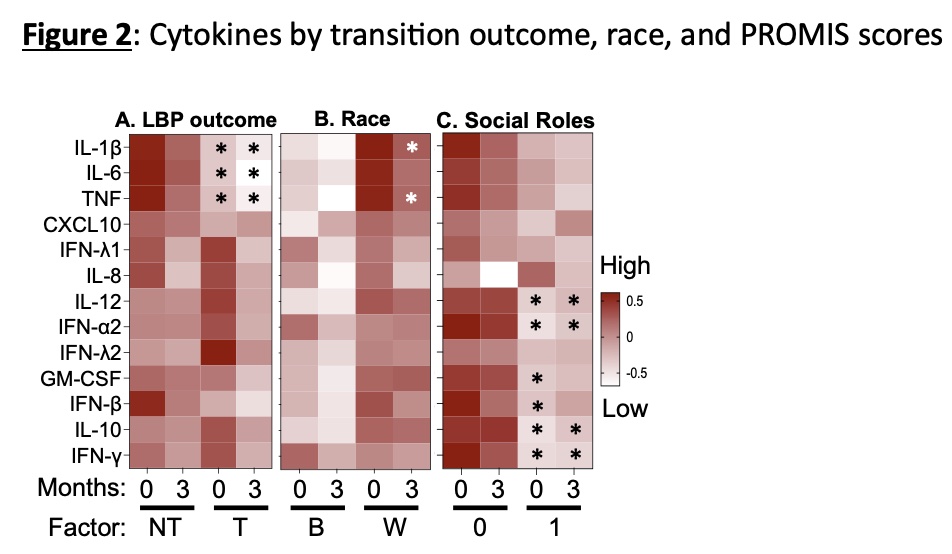Session Information
Date: Sunday, November 12, 2023
Title: (0145–0154) Epidemiology & Public Health – Interprofessional Poster
Session Type: Poster Session A
Session Time: 9:00AM-11:00AM
Background/Purpose: Chronic low back pain (cLBP) is common worldwide yet poorly understood due to the combination of biological, psychological, and sociological factors. An individual’s social determinants of health (SDOH) may influence biology by inducing immune responses. While these immune responses likely contribute to the development of cLBP, the mechanisms of how they contribute remain unknown. The purpose of this study is to investigate the relationship between SDOH and the immune system both in individuals who did and did not transition from acute to cLBP.
Methods: Adults (n=26) experiencing acute LBP (< 4 weeks) were recruited from the community. Data was gathered at baseline and 3-month follow-up to determine the participant’s low back pain status (i.e., transition to cLBP). Data on SDOH included measures of social connection and social roles, which were measured using the Social Network Index (SNI) recommended by the Institute of Medicine as well as the PROMIS Short Form – Global – Version 1.2 Global Social Activities and Roles Item. We also collected self-reported demographics (i.e., age, gender, and race) and peripheral blood samples. Peripheral blood mononuclear cell (PBMC) and plasma cytokines were analyzed, and cell-type specific immune activation or tolerance features were analyzed by high dimensional flow cytometry. Multiplex cytokine secretion after PBMC stimulation with innate immune activators were used to measure immune function and tolerance.
Results: Of the social factors, social roles were most associated with immune cell changes and plasma cytokines. Relative to inability to uphold social roles, confidence in one’s ability to uphold social roles was associated with lower inflammatory cytokines at baseline and follow-up, lower monocyte expression of TNF at baseline; but higher CD8 T cell proliferation/differentiation and relative increase in monocyte inflammation from baseline to follow-up (Figure 1). For self-reported demographic factors, when sub-grouped by race, White participants had higher inflammatory cytokines in plasma. Several immune cell differences between Black vs White race were observed, including higher levels of B cells; lower monocytes, CD141+ DCs, and regulatory T cells; lower immune suppressing ligands on B cells; and increased markers of T cell differentiation (Figure 1). PBMC functional measurements (i.e., responses to stimulation) revealed similar patterns within each race, wherein individuals who did not transition to cLBP mounted weaker responses than those who did transition to cLBP, possibly indicating immune tolerance/desensitization in participants that do not progress to cLBP (Figure 2).
Conclusion: SDOH such as race and social roles are associated with immune status and inflammation. Peripheral inflammation is lower in more desirable social factors (connection, roles, and stress) over time, with differences in monocyte inflammation at baseline. Differences in the immune system are observed based on race. While race alone does not explain these differences, it points to the need for further investigation into how SDOH influence the immune system leading to disparities in health outcomes.
To cite this abstract in AMA style:
Burke C, Brown M, Taylor K, Danyluk S, Seebeck K, Goode A. Impacts of Social Determinants of Health and the Immune System in Adults with Acute-to-Chronic Low Back Pain: An Observational Study [abstract]. Arthritis Rheumatol. 2023; 75 (suppl 9). https://acrabstracts.org/abstract/impacts-of-social-determinants-of-health-and-the-immune-system-in-adults-with-acute-to-chronic-low-back-pain-an-observational-study/. Accessed .« Back to ACR Convergence 2023
ACR Meeting Abstracts - https://acrabstracts.org/abstract/impacts-of-social-determinants-of-health-and-the-immune-system-in-adults-with-acute-to-chronic-low-back-pain-an-observational-study/


